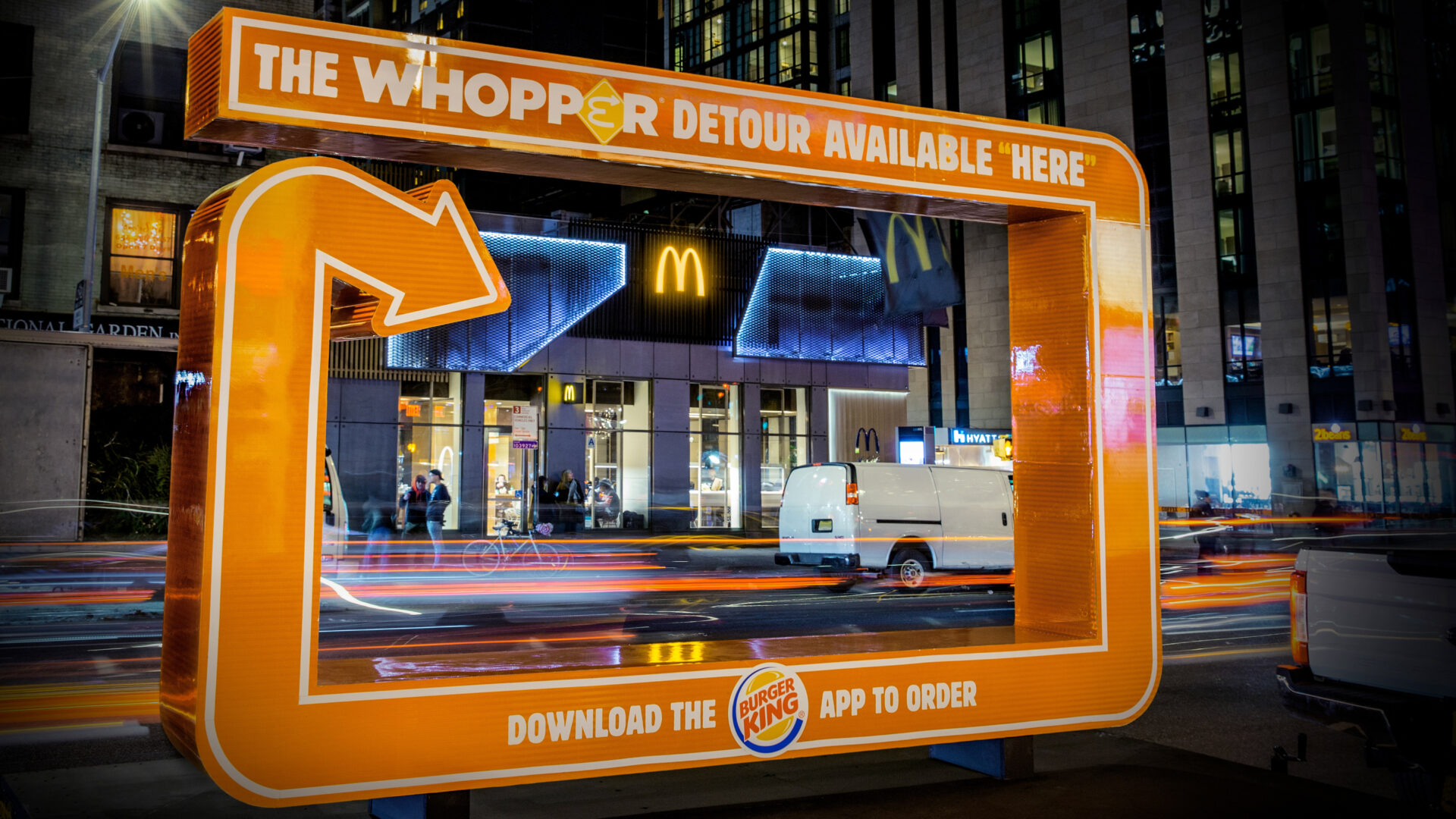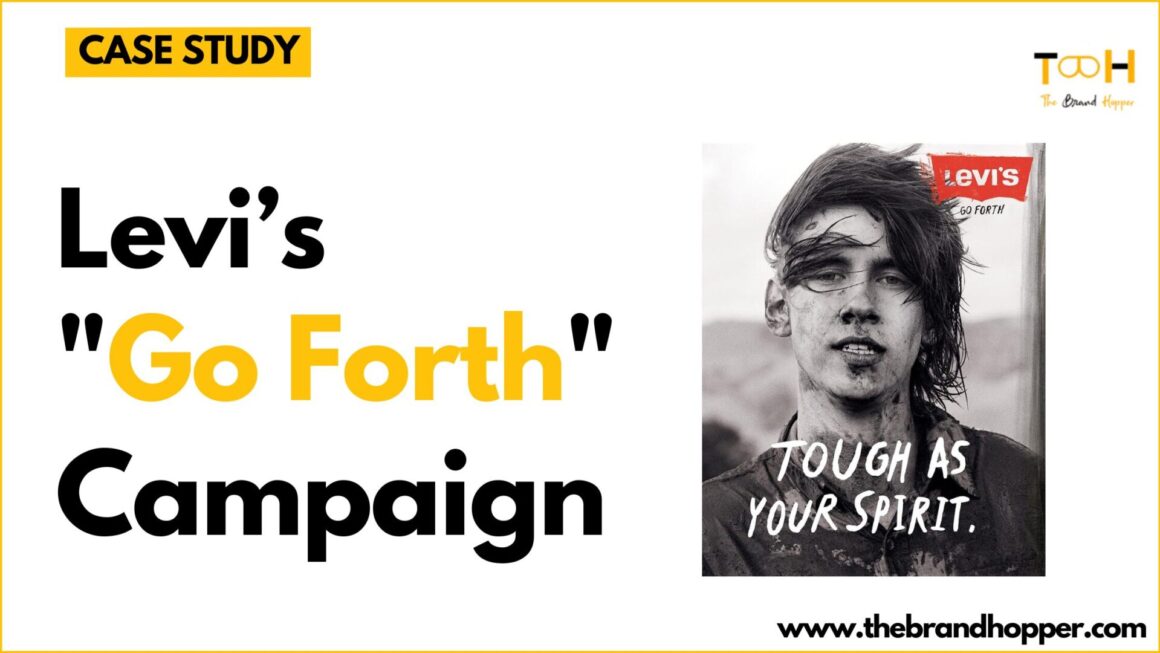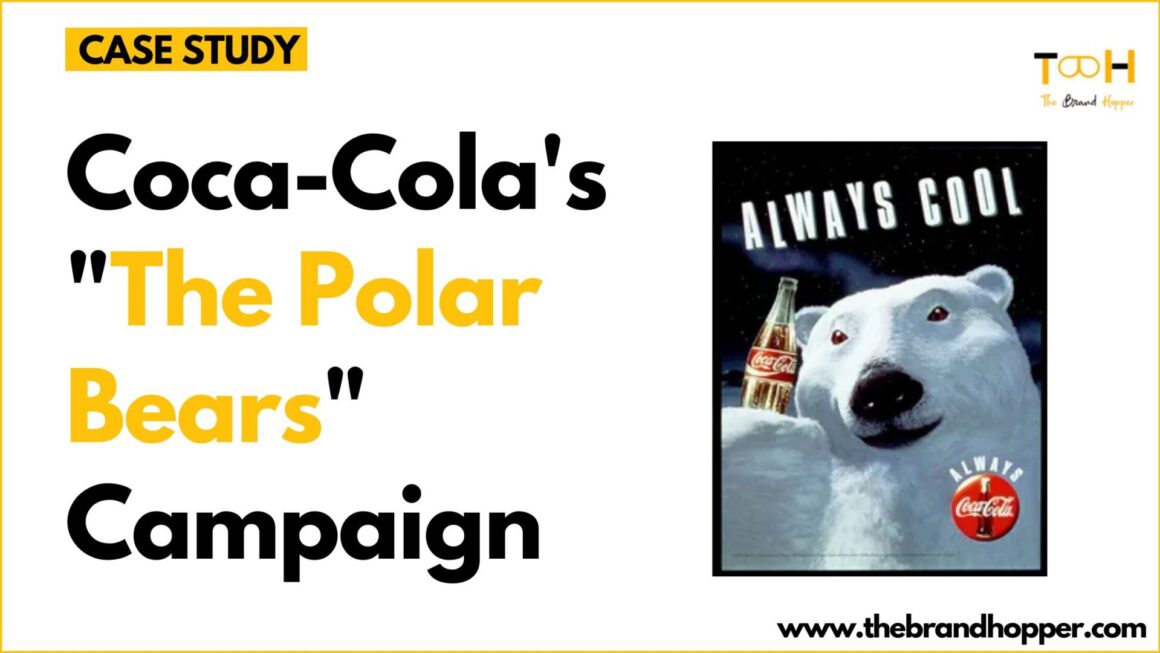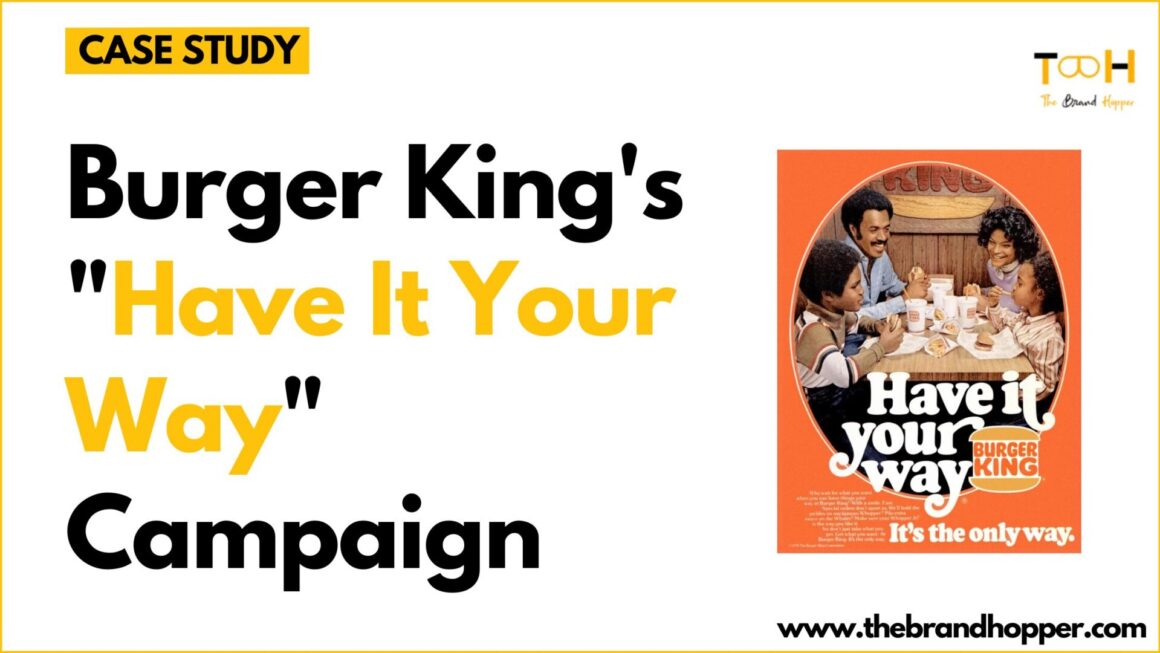In the fiercely competitive world of fast food, Burger King has always thrived on bold and innovative marketing tactics. But in 2018, the brand outdid itself with the audacious “Whopper Detour” campaign—an initiative that grabbed headlines and revolutionized mobile marketing and customer engagement.
Imagine this: Burger King encouraged its customers to visit a McDonald’s, only to reward them with a Whopper for just a penny. It sounds counterintuitive, even risky, but it was a stroke of genius that turned the fast-food battle on its head.
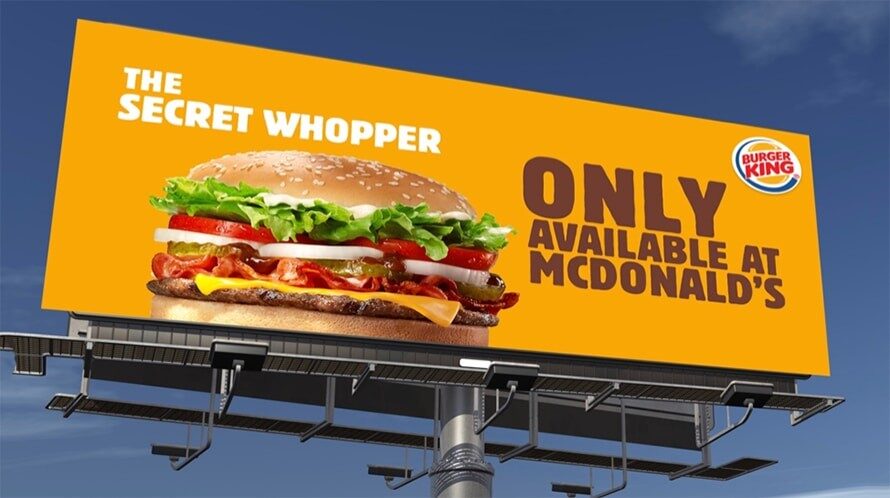
The campaign cleverly used geo-fencing technology, directing Burger King app users to McDonald’s locations to unlock the deal. This effectively hijacked the competitor’s foot traffic while boosting app downloads and engagement in unprecedented ways.
The result? Over 1.5 million app downloads in just nine days, a massive spike in sales, and Burger King reaffirming its status as a master of guerrilla marketing. The Whopper Detour wasn’t just a promotion; it was a bold statement in the art of marketing warfare.
This campaign didn’t just change the game—it rewrote the rulebook. Burger King proved that with audacity, humor, and smart technology, a brand can disrupt the norm and dominate the conversation.
Key Elements of the Campaign
Bold Concept:
The Whopper Detour campaign started with a daring idea—directing customers to McDonald’s to claim a nearly free Whopper. This bold move sparked curiosity and proved that taking risks in marketing can lead to big rewards.
Geo-Fencing Technology:
Burger King used geo-fencing technology to create a virtual perimeter around McDonald’s locations. When customers entered this zone, they could unlock the one-cent Whopper deal on the Burger King app, making the experience both unique and interactive.
Mobile App-Driven Strategy:
The campaign was all about boosting the Burger King app. By offering the deal exclusively through the app, Burger King saw a surge in engagement, with over 1.5 million downloads in just nine days—highlighting the power of mobile marketing.
Guerrilla Marketing Tactics:
The Whopper Detour showcased Burger King’s knack for guerrilla marketing. By cleverly “hijacking” McDonald’s customers and foot traffic, the brand created buzz and positioned itself as a fearless competitor willing to take on the big names.
Viral Buzz and Social Media Impact:
Designed to go viral, the campaign did just that. Social media was flooded with reactions and shares, extending the campaign’s reach far beyond the initial app users. The clever mix of humor, surprise, and rivalry made it a hot topic across platforms.
Record-Breaking Results:
The Whopper Detour wasn’t just a fun marketing stunt—it delivered real results. Beyond the massive increase in app downloads, the campaign drove significant sales and reinforced Burger King’s image as a bold and innovative brand.
Rewriting the Marketing Playbook:
By blending technology, humor, and competitive spirit, the Whopper Detour set a new standard for digital and experiential marketing. It showed that with creativity and a bit of audacity, brands can capture attention, engage customers, and disrupt the market in unforgettable ways.
Campaign Execution of Burger King’s Whopper Detour Campaign
Setting the Stage:
In December 2018, Burger King decided to break through the holiday advertising noise with something extraordinary. The goal? Create a buzzworthy moment that would grab everyone’s attention—and they did just that.
The Geo-Fencing Masterstroke:
At the heart of the campaign was a brilliant use of geo-fencing technology. Burger King set up virtual boundaries around more than 14,000 McDonald’s locations across the U.S. When customers came within 600 feet of a McDonald’s, the Burger King app sent a notification offering a Whopper for just one cent. This playful tactic not only attracted attention but also cleverly redirected traffic away from the competition.
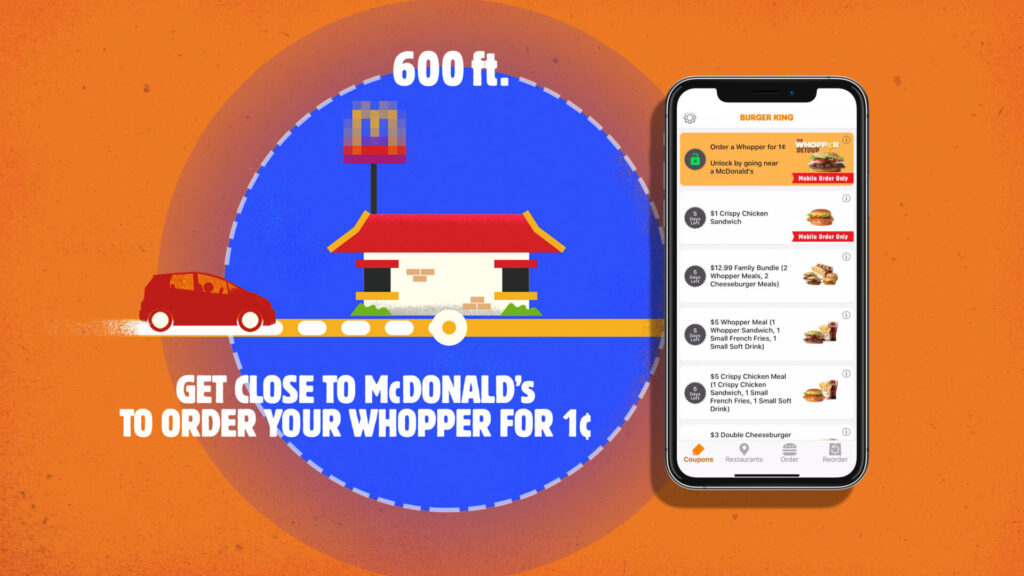
Driving App Engagement:
To snag that one-cent Whopper, customers had to download the Burger King app. This wasn’t just a fun promotion—it was a strategic move to boost app downloads and user engagement. Once people were in the app, they were likely to explore other features, making this a long-term win for Burger King.
Seamless User Experience:
The campaign made sure that the process was as smooth and fun as possible. After unlocking the deal, the app guided users to the nearest Burger King to pick up their Whopper. The seamless experience, combined with a touch of mischief, made it something customers were eager to share with friends and on social media.
Social Media Amplification:
Burger King knew this campaign had viral potential, so they encouraged users to share their experiences online. Social media platforms lit up with posts about one-cent Whoppers and detours to McDonald’s, extending the campaign’s reach far beyond the original audience.
Real-Time Reactions:
Throughout the campaign, Burger King’s social media team kept the momentum alive by engaging with users in real-time. Their witty responses and interactions made the brand feel more connected and personable, keeping the buzz going strong.
Wrapping Up with a Bang:
The Whopper Detour campaign lasted just nine days, but its impact was enormous. With over 1.5 million app downloads, a significant boost in sales, and tons of free media coverage, Burger King executed a bold idea with precision and creativity, leaving a lasting impression on the fast-food industry and the public.
Analysis of Burger King’s Whopper Detour Campaign
A Game-Changing Strategy:
The Whopper Detour campaign was nothing short of a marketing masterstroke. Burger King took a bold risk by directing customers to its biggest competitor, McDonald’s, to redeem a deal on their own product. This unconventional approach turned heads and demonstrated that sometimes the most unexpected strategies yield the greatest rewards. By flipping the traditional script, Burger King not only disrupted the fast-food industry but also set a new benchmark for creativity in marketing.
Leveraging Technology for Impact:
At the core of the campaign’s success was its clever use of geo-fencing technology. By creating virtual boundaries around McDonald’s locations, Burger King was able to engage customers in a way that felt both personal and playful. This technological innovation wasn’t just a gimmick; it was a powerful tool that transformed a simple promotion into an interactive experience. It highlighted how technology can be seamlessly integrated into marketing to create memorable and effective campaigns.
The Power of Mobile Marketing:
The Whopper Detour was designed to drive app downloads, and it did so with spectacular success. Over 1.5 million downloads in just nine days is a testament to how well the campaign resonated with consumers. This surge in app usage didn’t just benefit the promotion; it opened the door for Burger King to engage with customers long after the campaign ended. It’s a shining example of how mobile marketing, when done right, can have a lasting impact on customer engagement.
Mastering Guerrilla Marketing:
Burger King’s cheeky move to direct traffic away from McDonald’s was a classic example of guerrilla marketing at its finest. By leveraging humor and a bit of competitive rivalry, the brand was able to capture public attention and generate massive buzz. This campaign proved that taking a playful jab at the competition can be incredibly effective when executed with wit and creativity.
Social Media Amplification:
One of the key drivers of the campaign’s success was its viral nature. By encouraging users to share their Whopper Detour experiences on social media, Burger King amplified the campaign’s reach far beyond its initial audience. The flood of posts, tweets, and shares created a buzz that traditional advertising simply couldn’t match. This highlights the importance of designing campaigns that are inherently shareable and capable of generating organic online chatter.
Real-Time Engagement:
Burger King’s quick and witty responses to social media posts during the campaign kept the momentum alive. This real-time engagement not only fueled the conversation but also made the brand feel more connected and responsive to its audience. It’s a reminder that being active and engaged on social media can enhance a campaign’s effectiveness and build stronger customer relationships.
A Lasting Impact:
The Whopper Detour campaign wasn’t just a fleeting success—it left a lasting impression on both the industry and the public. By combining bold strategy, innovative technology, and sharp execution, Burger King set a new standard for what a modern marketing campaign can achieve. The campaign’s legacy is a testament to the power of creativity, risk-taking, and the willingness to challenge conventional wisdom.
Results of Burger King’s Whopper Detour Campaign
Here are the results of Burger King’s Whopper Detour Campaign broken down by the numbers:
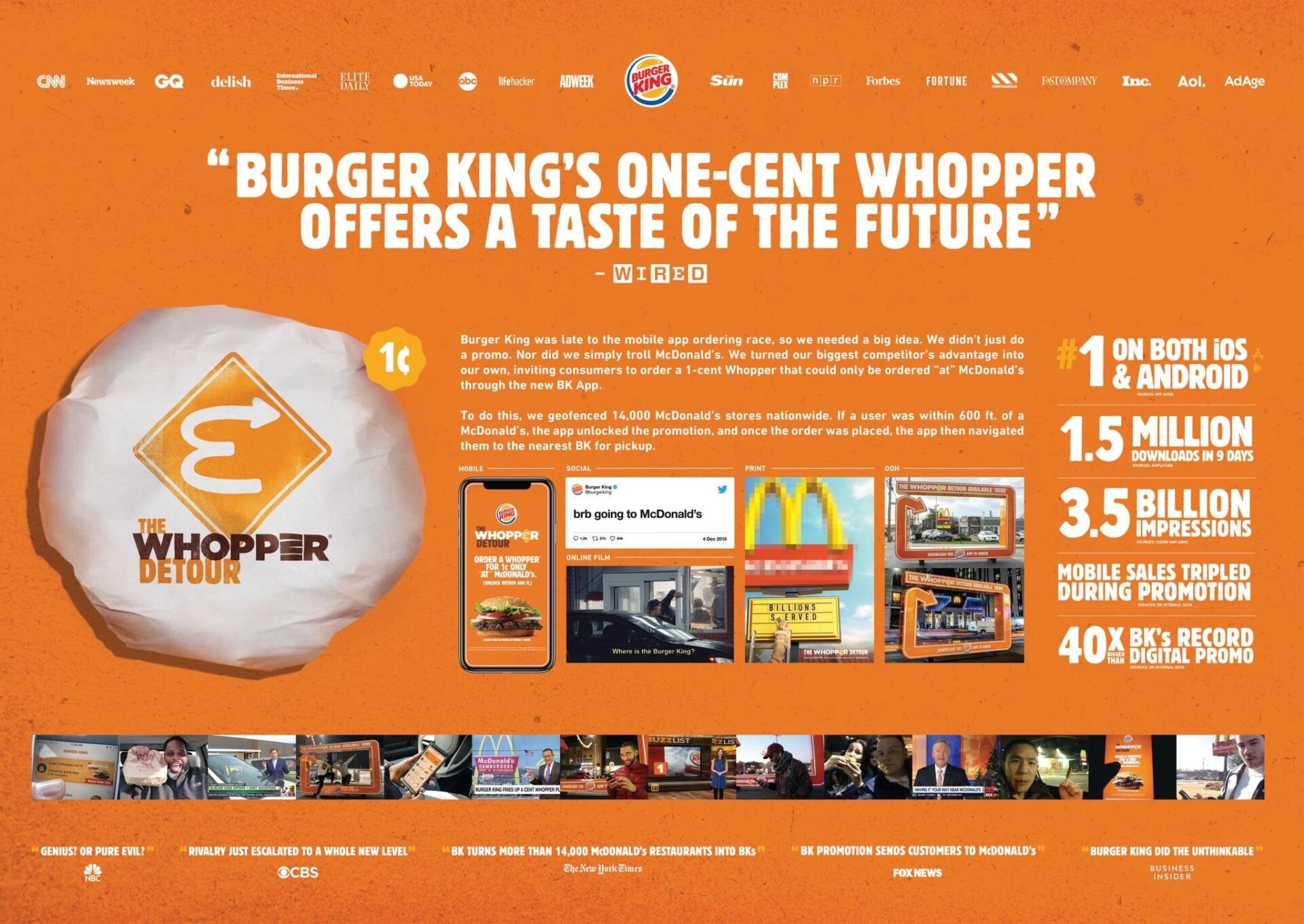
App Downloads:
The campaign drove over 1.5 million app downloads within just nine days, catapulting the Burger King app to the top of the app store charts.
Sales Increase:
The Whopper Detour led to a 54% increase in mobile order sales, showcasing the campaign’s effectiveness in driving immediate revenue.
Social Media Impact:
The campaign generated 3.5 billion impressions on social media, with millions of users engaging with the content and sharing their experiences online.
Media Coverage:
The campaign received extensive media coverage, earning over $40 million in earned media—a significant boost considering the relatively low cost of executing the campaign.
Engagement Rate:
Burger King saw a 37% increase in engagement across its social media platforms, driven by the viral nature of the campaign and the brand’s real-time interaction with users.
Market Share:
The campaign contributed to an 8% increase in market share for Burger King during the campaign period, demonstrating its impact on the competitive landscape.
These impressive numbers highlight the campaign’s massive success and its ability to deliver tangible results for the brand.
Lessons Learned from the Campaign
Here are the key lessons from Burger King’s Whopper Detour campaign:
Bold Risks Can Lead to Big Rewards:
Burger King’s decision to direct customers to a competitor was unconventional but highly effective. Taking bold, unconventional risks in marketing can result in significant payoffs and set your brand apart.
Leverage Technology to Enhance Engagement:
The use of geo-fencing technology turned a simple promotion into an engaging, interactive experience. Creative use of technology can elevate your campaign, making it more engaging and memorable for consumers.
Social Media Amplification Is Essential:
The campaign’s success was fueled by social media sharing, which extended its reach far beyond the original audience. Design campaigns that are easily shareable and encourage organic online buzz to maximize their impact.
Humor and Playfulness Connect with Audiences:
The playful rivalry with McDonald’s made the campaign fun and relatable. Injecting humor into your marketing can make your brand more relatable and help forge a stronger connection with your audience.
Also Read: A Case Study on Airbnb’s Belong Anywhere Campaign
To read more content like this, subscribe to our newsletter

